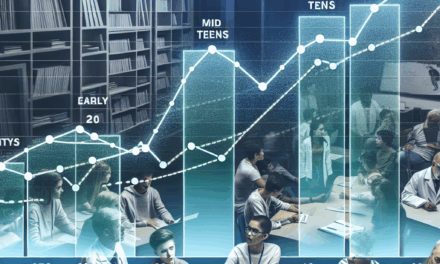Cognitive Insights and Innovation: Shaping the Future of Healthcare
The healthcare industry is undergoing a transformative phase, driven by advancements in cognitive technologies and innovative practices. As we delve into the intersection of cognitive insights and healthcare, it becomes evident that these elements are not just enhancing patient care but are also reshaping the entire healthcare landscape. This article explores five critical subtopics that highlight how cognitive insights and innovation are shaping the future of healthcare.
1. Understanding Cognitive Insights in Healthcare
Cognitive insights refer to the ability of systems to analyze vast amounts of data, recognize patterns, and provide actionable intelligence. In healthcare, this means leveraging artificial intelligence (AI), machine learning, and data analytics to improve decision-making processes, enhance patient outcomes, and streamline operations.
One of the most significant applications of cognitive insights in healthcare is predictive analytics. By analyzing historical patient data, healthcare providers can predict future health events, allowing for proactive interventions. For instance, a study published in the journal *Health Affairs* found that predictive analytics could reduce hospital readmission rates by up to 20%. This not only improves patient care but also reduces costs associated with unnecessary hospital stays.
Moreover, cognitive insights can enhance diagnostic accuracy. AI algorithms can analyze medical images, such as X-rays and MRIs, with remarkable precision. A notable example is Google’s DeepMind, which developed an AI system that can detect over 50 eye diseases with an accuracy rate comparable to that of expert ophthalmologists. This capability not only speeds up the diagnostic process but also ensures that patients receive timely treatment.
Furthermore, cognitive insights facilitate personalized medicine. By analyzing genetic data alongside clinical information, healthcare providers can tailor treatments to individual patients, improving efficacy and reducing adverse effects. For example, the use of pharmacogenomics allows clinicians to prescribe medications based on a patient’s genetic makeup, optimizing therapeutic outcomes.
2. Innovations in Telemedicine and Remote Patient Monitoring
The COVID-19 pandemic accelerated the adoption of telemedicine, a field that has seen significant innovation in recent years. Telemedicine leverages cognitive insights to enhance patient care, making healthcare more accessible and efficient.
Remote patient monitoring (RPM) is a key innovation within telemedicine. RPM involves the use of digital technologies to monitor patients outside traditional clinical settings. Devices such as wearable fitness trackers, smartwatches, and mobile health applications collect real-time data on patients’ vital signs, activity levels, and overall health status. This data is then analyzed using cognitive insights to provide healthcare providers with a comprehensive view of a patient’s health.
For instance, a study published in the *Journal of Medical Internet Research* found that RPM can lead to a 50% reduction in hospital admissions for patients with chronic conditions such as heart failure and diabetes. By continuously monitoring patients, healthcare providers can identify potential health issues before they escalate, allowing for timely interventions.
Moreover, telemedicine platforms are increasingly incorporating AI-driven chatbots and virtual assistants to enhance patient engagement. These tools can answer patient queries, schedule appointments, and provide medication reminders, thereby improving adherence to treatment plans. A survey conducted by the American Medical Association revealed that 60% of patients prefer using telehealth services for non-emergency medical issues, highlighting the growing acceptance of this innovative approach.
However, challenges remain in the widespread adoption of telemedicine. Issues such as digital literacy, access to technology, and reimbursement policies need to be addressed to ensure equitable access to these services. Nevertheless, the innovations in telemedicine and RPM represent a significant step towards a more patient-centered healthcare system.
3. The Role of Artificial Intelligence in Drug Discovery
Drug discovery is a complex and time-consuming process, often taking over a decade and costing billions of dollars. However, cognitive insights powered by artificial intelligence are revolutionizing this field, making it faster and more efficient.
AI algorithms can analyze vast datasets, including chemical compounds, biological data, and clinical trial results, to identify potential drug candidates. For example, Atomwise, a company specializing in AI-driven drug discovery, uses deep learning algorithms to predict how different molecules will interact with specific biological targets. This approach has led to the identification of promising compounds for diseases such as Ebola and multiple sclerosis in a fraction of the time it would take using traditional methods.
Moreover, AI can optimize clinical trial designs by identifying suitable patient populations and predicting outcomes. This not only accelerates the drug development process but also increases the likelihood of success in clinical trials. A report by the Biotechnology Innovation Organization (BIO) indicated that AI could reduce the time to market for new drugs by up to 30%, significantly lowering development costs.
Additionally, cognitive insights can enhance post-market surveillance of drugs. By analyzing real-world data from electronic health records and social media, AI can identify adverse drug reactions and long-term effects that may not have been evident during clinical trials. This capability is crucial for ensuring patient safety and improving drug efficacy.
Despite these advancements, challenges such as data privacy concerns, regulatory hurdles, and the need for collaboration between AI companies and pharmaceutical firms must be addressed. Nevertheless, the integration of AI in drug discovery holds immense potential for transforming the pharmaceutical industry and improving patient outcomes.
4. Enhancing Patient Engagement through Digital Health Solutions
Patient engagement is a critical component of effective healthcare delivery. Cognitive insights and digital health solutions are playing a pivotal role in enhancing patient engagement, leading to better health outcomes and increased satisfaction.
Digital health solutions, including mobile health applications, patient portals, and online communities, empower patients to take an active role in their healthcare. These tools provide patients with access to their health information, educational resources, and communication channels with healthcare providers. For instance, the use of patient portals has been shown to improve medication adherence and increase patient satisfaction by providing easy access to lab results and appointment scheduling.
Moreover, cognitive insights can personalize patient interactions. By analyzing patient data, healthcare providers can tailor communication strategies to meet individual needs. For example, a study published in *Health Communication* found that personalized messaging significantly increased patient engagement in chronic disease management programs. Patients who received tailored reminders and educational materials were more likely to adhere to their treatment plans.
Social media platforms also play a role in enhancing patient engagement. Online communities allow patients to share experiences, seek support, and access valuable information. A survey conducted by the Pew Research Center found that 72% of internet users have searched for health information online, highlighting the importance of digital platforms in patient education.
However, challenges such as digital literacy, privacy concerns, and the digital divide must be addressed to ensure that all patients can benefit from these innovations. Healthcare providers must prioritize inclusivity and accessibility in their digital health strategies to maximize patient engagement and improve health outcomes.
5. The Future of Healthcare: Ethical Considerations and Challenges
As cognitive insights and innovations continue to shape the future of healthcare, ethical considerations and challenges must be addressed. The integration of AI and data analytics raises important questions about privacy, bias, and accountability.
Data privacy is a significant concern in healthcare, particularly with the increasing use of electronic health records and wearable devices. Patients must trust that their sensitive health information is protected and used responsibly. The Health Insurance Portability and Accountability Act (HIPAA) sets standards for protecting patient data, but as technology evolves, so too must regulations to ensure patient privacy.
Moreover, bias in AI algorithms poses a challenge to equitable healthcare delivery. If AI systems are trained on biased datasets, they may perpetuate existing disparities in healthcare outcomes. For example, a study published in *Science* found that an AI algorithm used in healthcare disproportionately favored white patients over Black patients in predicting health risks. Addressing bias in AI requires diverse datasets and ongoing monitoring to ensure fairness and equity in healthcare delivery.
Accountability is another critical issue. As AI systems take on more decision-making roles in healthcare, determining responsibility for errors or adverse outcomes becomes complex. Clear guidelines and regulations are needed to establish accountability in the use of AI in clinical settings.
Despite these challenges, the future of healthcare is promising. By addressing ethical considerations and fostering collaboration between technology developers, healthcare providers, and policymakers, we can harness the power of cognitive insights and innovation to create a more effective, equitable, and patient-centered healthcare system.
Conclusion
The integration of cognitive insights and innovation is reshaping the future of healthcare in profound ways. From enhancing diagnostic accuracy and personalizing treatment to improving patient engagement and accelerating drug discovery, these advancements hold immense potential for transforming healthcare delivery.
As we navigate this evolving landscape, it is crucial to address the ethical considerations and challenges that accompany these innovations. By prioritizing data privacy, equity, and accountability, we can ensure that the benefits of cognitive insights are realized by all patients.
In summary, the future of healthcare is bright, driven by cognitive insights and innovative practices. By embracing these changes, we can create a healthcare system that is not only more efficient but also more responsive to the needs of patients, ultimately leading to better health outcomes for all.





